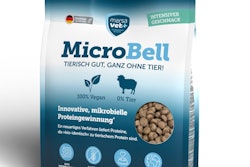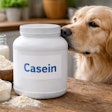
The eight-month target animal safety study, published in the journal Animals, was conducted under FDA Center for Veterinary Medicine guidelines and supports Calysta's planned GRAS notification for the US market. Thirty-two healthy adult beagles were fed diets containing up to 8% FeedKind Pet protein for six months, followed by a two-month period on a control diet.
"This new peer-reviewed research is the most robust and longest study we've ever done on FeedKind Pet protein, adding to years of evidence showing it is a safe, high-quality protein source for animals," said Alan Shaw, CEO and Co-Founder of Calysta. "A science and safety focus has been key to our journey from pilot production to the thousands of tonnes shipped this year. For the pet food industry, FeedKind Pet is a pioneering cultured protein ingredient that brings real innovation and new formulation choices, backed by proven performance and supply security."
Results confirmed that FeedKind Pet protein can be safely included in dog food formulations, with dogs maintaining healthy weight and body condition scores throughout the study period. Feed intake remained unaffected, and digestibility measurements were high across all metrics.
Study results
According to the study, the research demonstrated protein and energy digestibility rates consistently exceeding 80%, while fat digestibility exceeded 90%. Additionally, the study revealed positive shifts in the dogs' fecal microbiome, including increased alpha diversity, which researchers noted as an early indicator of potential gut health benefits.
All dogs maintained normal health, weight, and body condition throughout the study period. Dogs readily accepted FeedKind Pet at all inclusion levels tested, with no impact on feed intake observed.
The study also noted inclusion of FeedKind Pet protein increased alpha diversity in the gut microbiome and promoted healthy bacteria populations, suggesting potential gut health support benefits.
"Customers in Europe are already using FeedKind Pet protein to strengthen supply chains and deliver high-quality nutrition for pets," said Herman Sloot, VP of Global Sales at Calysta. "This latest long-term study sets us up to meet the requirements for US GRAS status and gives our customers the confidence to plan for global availability; knowing they have a secure, well-tolerated protein source that works for pets and owners everywhere."
Production and availability
FeedKind Pet protein is produced through natural fermentation and requires no arable land and minimal water resources. The ingredient provides pet food manufacturers with a stable, scalable protein supply that does not compete with human food resources.
Calysta said it currently supplies customers in Europe and is positioned to scale production globally as demand increases for alternative protein ingredients. The company previously launched FeedKind Aqua for aquaculture applications.
FeedKind protein is produced using fermentation technology that converts low-cost carbon into protein. The cultured protein ingredient is non-GMO, contains a complete amino acid profile, and is produced with minimal water usage and no agricultural land requirements.
Calysta, Inc., based in San Mateo, California, U.S., produces large-scale protein through fermentation technology. The company develops feed and food products by fermenting carbon sources to create protein ingredients for various applications.
















